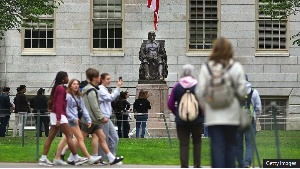- Home - News
- Elections 2024
- News Archive
- Crime & Punishment
- Politics
- Regional
- Editorial
- Health
- Ghanaians Abroad
- Tabloid
- Africa
- Religion
- Photo Archives
- Press Release
General News of Monday, 26 May 2025
Source: www.ghanawebbers.com
International Students face uncertainty amid Trump Administration’s Harvard enrollment restriction
The Trump administration has issued a directive affecting Harvard University. The Department of Homeland Security (DHS) states that Harvard cannot enroll international students. Existing foreign students must transfer or risk losing their legal status.
A federal judge has intervened. U.S. District Judge Allison Burroughs granted Harvard's emergency motion. This blocks the DHS from enforcing its directive while litigation continues.
Judge Burroughs noted that Harvard would suffer immediate harm if the directive took effect. The ruling temporarily halts the DHS restrictions as the legal battle unfolds.
This directive, framed as a national security issue, has sparked controversy. It particularly affects African students who planned to attend Harvard.
For many African students, this situation is significant. Ivy League schools like Harvard provide vital educational opportunities. Losing access to these prospects creates fear and uncertainty among current and prospective students.
A Ghanaian student at Harvard expressed concern anonymously. They said, “This directive feels like a direct attack on our future.” Education is not just about learning; it’s about making a difference back home.
Legal experts question the DHS's authority for such sweeping restrictions. Analysts are concerned about due process and the statutory basis for this action under immigration law. Some argue that the DHS is overstepping its executive powers.
Harvard officials worry that some demands may infringe on constitutional rights. They believe an audit of student views exceeds federal authority. Such restrictions could undermine important academic exchange programs in Africa.
The timing of this mandate raises political questions. Homeland Security Secretary Kristi Noem stated that international enrollment is a privilege, not a right. She added that Harvard could restore its privileges by submitting five years of records within 72 hours.
The DHS seeks detailed documentation on foreign student protests deemed illegal or dangerous. Many see this demand as an attempt to stifle academic freedom and dissent, especially after recent criticisms of Harvard’s handling of pro-Palestinian demonstrations.
For African students facing barriers to education, these political motives may deter them from applying to U.S. institutions. Critics argue that while national security is important, the administration's approach lacks nuance and consideration for international students' needs.
Harvard hosts many international students; 6,793 made up 27% of its student body in 2024-2025. Restricting enrollment could weaken research partnerships and jeopardize U.S leadership in higher education globally.
For African countries reliant on collaboration for development, these effects could be severe. Future projects and partnerships may be significantly curtailed due to reduced access to U.S institutions.
This situation highlights challenges faced by African students pursuing education abroad. Historically, countries like Ghana and Nigeria have sent many talented individuals to Harvard with hopes of returning home equipped with skills for development.
The directive might discourage applications from African students—impacting global intellectual exchange negatively. This could accelerate brain drain as Africa risks losing bright minds to more welcoming educational systems elsewhere.
Harvard has not directly responded but values its international community highly. The university's International Office has expanded virtual advising services for affected students during this uncertain time.
While acknowledging safety concerns on campuses, the broad nature of demands raises questions about academic freedom overall. Ongoing legal battles will reveal more about the consequences of this directive.
For African students, especially Ghanaians, this moment underscores the importance of international academic exchange opportunities. A transparent dialogue is needed to balance national security with creating safe educational environments worldwide through cooperation and commitment to academic freedom.











